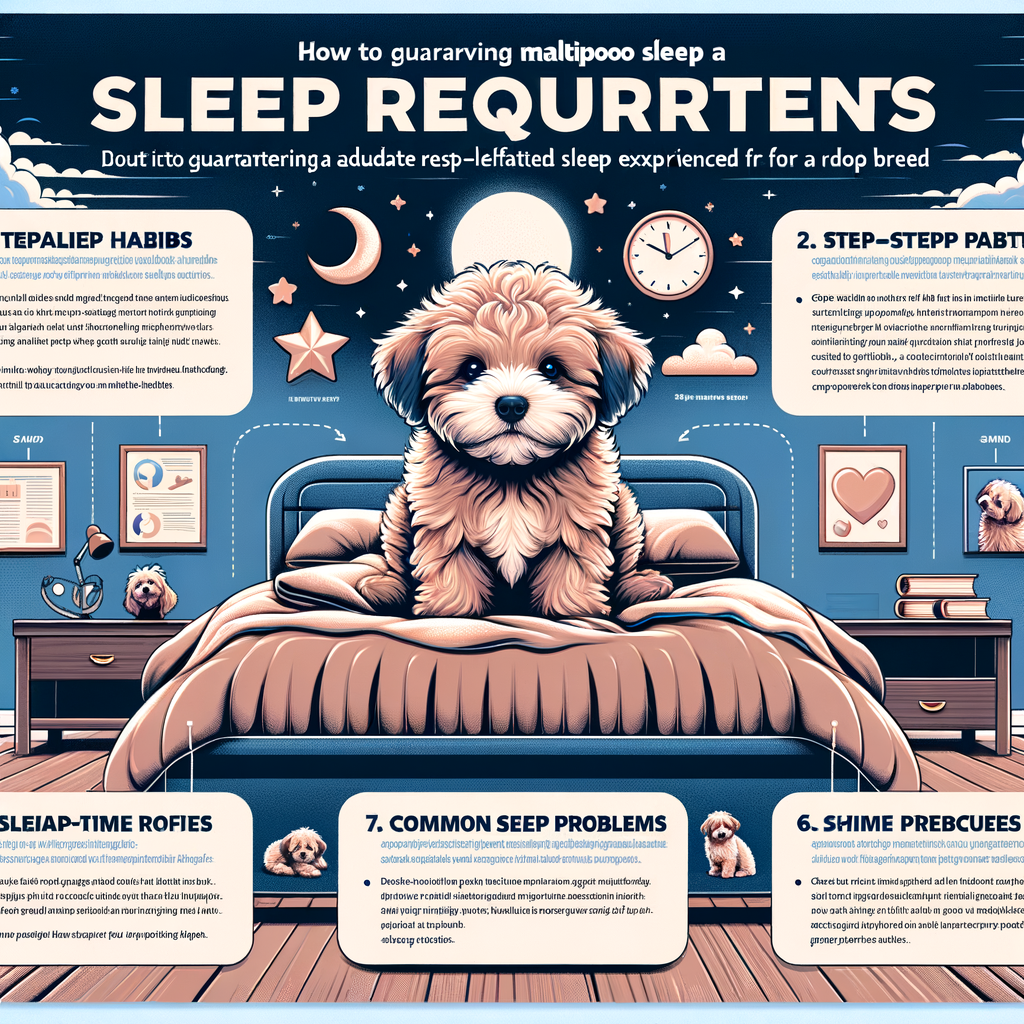
Maltipoo Sleep Requirements: An Overview
Understanding the sleep requirements of your Maltipoo is crucial to ensure their health and happiness. In this section, we will delve into the importance of sleep for Maltipoos, their typical sleep needs, and the factors that can affect these requirements.
- Understanding the importance of sleep for Maltipoos
- Typical sleep needs of a Maltipoo
- Factors affecting Maltipoo sleep requirements
Sleep plays a vital role in the overall well-being of a Maltipoo. It is during sleep that their body repairs tissues, builds bone and muscle, and consolidates memories. Lack of adequate sleep can lead to a host of health issues, including weakened immunity, behavioral problems, and reduced life span. Therefore, ensuring your Maltipoo gets enough sleep is as important as providing them with a balanced diet and regular exercise.
On average, a Maltipoo requires between 12 to 14 hours of sleep per day. Puppies and older dogs may need even more sleep, up to 18 hours a day. However, it’s important to note that every Maltipoo is unique, and their sleep needs can vary based on their age, health, and activity level.
Several factors can influence how much sleep a Maltipoo needs. These include their age, with puppies and older dogs requiring more sleep than adult dogs. Their health status also plays a role; dogs with health issues may need more rest. Additionally, the amount of physical and mental stimulation a Maltipoo gets can affect their sleep needs. Dogs that are more active during the day may require more sleep to recover and recharge.
In the following sections, we will delve deeper into Maltipoo sleep habits, bedtime basics, sleep training tips, and how to ensure your Maltipoo gets enough sleep. Stay tuned for a comprehensive guide on Maltipoo sleep requirements.
Maltipoo Sleep Habits: What to Expect
Understanding the sleep habits of your Maltipoo can be a key element in ensuring their overall health and happiness. Here are some important factors to consider:
- Common sleep patterns in Maltipoos
- How age influences Maltipoo sleep habits
- How to identify sleep issues in Maltipoos
Maltipoos, like other small dog breeds, typically sleep around 12-14 hours per day. However, this can vary depending on their level of activity and overall health. Puppies and older dogs tend to sleep more than young adults. It’s not uncommon for Maltipoos to take several naps throughout the day, in addition to sleeping through the night.
Age plays a significant role in a Maltipoo’s sleep habits. Puppies, due to their high energy levels and growth needs, often sleep up to 18 hours a day. As they grow into adulthood, their sleep time decreases to around 12-14 hours. Senior Maltipoos, however, may require more sleep due to decreased energy levels and potential health issues.
Changes in your Maltipoo’s sleep patterns could be a sign of underlying health issues. If your Maltipoo is sleeping excessively or having trouble sleeping, it could be due to a variety of factors such as stress, poor diet, lack of exercise, or medical conditions. Look out for signs like restlessness, difficulty falling asleep, or changes in their usual sleep schedule. If you notice any of these symptoms, it’s best to consult with a veterinarian.
In conclusion, understanding your Maltipoo’s sleep habits can help you better care for them and ensure they lead a healthy and happy life. Always remember that each Maltipoo is unique and their sleep needs may vary. So, keep an eye on their sleep patterns and don’t hesitate to seek professional help if you notice any changes.
Bedtime Basics for Maltipoos
Ensuring your Maltipoo gets a good night’s sleep is essential for their health and happiness. Here are some tips to help create a comfortable sleep environment for your furry friend.
Creating a Comfortable Sleep Environment
Creating a comfortable sleep environment for your Maltipoo involves three key steps:
- Choosing the right bed for your Maltipoo
- Setting the right temperature for sleep
- Providing a quiet and dark environment
Just like humans, dogs also need a comfortable place to sleep. The bed should be soft, cozy, and the right size for your Maltipoo. A bed that is too small can make your pet feel cramped, while a bed that is too large can make them feel insecure. A bed with raised edges can also provide a sense of security and comfort for your Maltipoo.
Maltipoos, with their thick fur, can get hot easily. Therefore, it’s important to maintain a cool temperature in the room where your Maltipoo sleeps. A room temperature of around 65-75 degrees Fahrenheit is generally comfortable for most dogs.
Dogs, like humans, sleep better in a quiet and dark environment. Try to minimize noise and light as much as possible. You can use blackout curtains or blinds to block out light, and a white noise machine or fan to drown out any disruptive noises.
Remember, every Maltipoo is unique and may have different sleep preferences. It may take some time and experimentation to figure out what works best for your pet. But with patience and love, you can create a sleep environment that helps your Maltipoo get the rest they need.
Establishing a Consistent Bedtime Routine
Establishing a consistent bedtime routine is crucial for your Maltipoo’s overall health and well-being. A regular routine can help your pet feel safe and secure, leading to better sleep quality. Here are some steps you can take to create a consistent bedtime routine for your Maltipoo:
- Setting a Regular Sleep Schedule
- Incorporating Calming Activities Before Bed
- Feeding and Bathroom Schedules
Just like humans, Maltipoos thrive on routine. Try to set a regular bedtime and wake-up time for your pet. This consistency can help regulate your Maltipoo’s internal clock, making it easier for them to fall asleep at night and wake up in the morning. Remember, adult Maltipoos typically need 12-14 hours of sleep per day, while puppies may require up to 18 hours.
Help your Maltipoo wind down with calming activities before bed. This could include a gentle walk, a quiet play session, or a soothing massage. Avoid high-energy activities close to bedtime as these can make it harder for your pet to settle down. You might also consider using calming pet products, such as a lavender-scented pet bed or a white noise machine, to create a more relaxing sleep environment.
Feeding your Maltipoo too close to bedtime can lead to discomfort and disrupt their sleep. Try to schedule your pet’s last meal a few hours before bed. Also, ensure your Maltipoo has a chance to go to the bathroom before bedtime to avoid nighttime accidents or disruptions. Remember, consistency is key. Try to stick to the same feeding and bathroom schedule every day, even on weekends.
In conclusion, a consistent bedtime routine can significantly improve your Maltipoo’s sleep quality and overall health. Start by setting a regular sleep schedule, incorporating calming activities before bed, and establishing consistent feeding and bathroom schedules. Remember, every dog is unique, so it may take some time to find the routine that works best for your Maltipoo. Be patient and persistent, and you’ll soon see the benefits of a consistent bedtime routine.
Maltipoo Sleep Training: Tips and Techniques
Training your Maltipoo to have a good night’s sleep is an essential part of their overall health and happiness. Here are some tips and techniques to help your furry friend sleep through the night, deal with separation anxiety at bedtime, and address common sleep issues.
- Training Your Maltipoo to Sleep Through the Night
- Dealing with Separation Anxiety at Bedtime
- Addressing Common Sleep Issues in Maltipoos
Just like humans, Maltipoos need a comfortable and quiet environment to sleep. Start by setting a consistent bedtime routine. This could include a short walk before bed, a quiet playtime, or a gentle massage. Make sure their bed is comfortable and in a quiet, dark place. Over time, your Maltipoo will associate these activities with sleep and will start to feel sleepy when the routine begins.
Separation anxiety can make bedtime a challenge for both you and your Maltipoo. To help your pet cope, try to spend quality time with them before bed. A comforting toy or blanket that smells like you can also help. Remember, it’s important to be patient and consistent. It might take time, but your Maltipoo will eventually learn that bedtime is a safe and peaceful time, not a time for anxiety.
Some common sleep issues in Maltipoos include restlessness, frequent waking, and difficulty falling asleep. These can often be addressed by ensuring your pet has enough physical and mental stimulation during the day. A tired Maltipoo is a well-sleeping Maltipoo! If these issues persist, it might be a good idea to consult with a vet to rule out any underlying health issues.
Remember, every Maltipoo is unique and what works for one might not work for another. It’s important to be patient, consistent, and to try different techniques until you find what works best for your furry friend.
| Tips | Techniques |
|---|---|
| Set a consistent bedtime routine | Short walk, quiet playtime, gentle massage |
| Spend quality time before bed | Comforting toy or blanket that smells like you |
| Ensure enough physical and mental stimulation | Regular exercise, interactive toys, training sessions |
Ensuring Enough Sleep for Your Maltipoo
Ensuring your Maltipoo gets enough sleep is crucial for their health and well-being. One of the best ways to do this is by monitoring their sleep patterns. This involves keeping track of their sleep habits, noticing any changes, and knowing when to consult a vet. Let’s delve deeper into these aspects.
Monitoring Your Maltipoo’s Sleep Patterns
Monitoring your Maltipoo’s sleep patterns can provide valuable insights into their overall health. Here are some steps you can take:
- Keeping a sleep diary for your Maltipoo
- Noticing changes in sleep habits
- When to consult a vet about your Maltipoo’s sleep
Just like humans, dogs have sleep cycles too. Keeping a sleep diary for your Maltipoo can help you understand their sleep patterns better. Note down the time they go to sleep, wake up, and any sleep disturbances they may have during the night. This will help you identify any irregularities and take necessary action.
Changes in your Maltipoo’s sleep habits could be a sign of underlying health issues. If your Maltipoo is sleeping more or less than usual, or if their sleep is disturbed, it could indicate a problem. Keep an eye out for changes such as difficulty falling asleep, restlessness during sleep, or excessive daytime sleepiness.
If you notice any significant changes in your Maltipoo’s sleep patterns, it’s important to consult a vet. This includes changes such as insomnia, excessive sleepiness, or unusual behaviors during sleep. Your vet can help identify any underlying health issues and provide appropriate treatment.
Remember, your Maltipoo’s sleep is an important aspect of their health. By monitoring their sleep patterns, you can ensure they get the rest they need for a happy, healthy life.
Promoting Good Sleep Health in Maltipoos
Ensuring your Maltipoo gets enough sleep is crucial for their overall health. There are several ways to promote good sleep health in your furry friend, including regular exercise, a balanced diet, and regular vet check-ups.
- Importance of Regular Exercise for Good Sleep
Exercise plays a significant role in promoting good sleep health in Maltipoos. Regular physical activity helps to burn off energy, reducing restlessness at night. It also aids in maintaining a healthy weight, which can prevent sleep apnea, a condition that disrupts sleep.
- Role of Diet in Promoting Good Sleep
What your Maltipoo eats can also affect their sleep. A balanced diet rich in proteins, vitamins, and minerals can help regulate your pet’s sleep-wake cycle. Foods high in tryptophan, an amino acid that helps produce sleep-inducing hormones, can also promote better sleep. Avoid feeding your Maltipoo right before bedtime as it can cause discomfort and disrupt their sleep.
- Benefits of Regular Vet Check-ups
Regular vet check-ups are essential for your Maltipoo’s sleep health. A vet can identify any underlying health issues that may be disrupting your pet’s sleep. Regular check-ups can also ensure that your Maltipoo is up-to-date with vaccinations and parasite treatments, contributing to better overall health and improved sleep.
In conclusion, promoting good sleep health in your Maltipoo involves regular exercise, a balanced diet, and frequent vet check-ups. By following these guidelines, you can help ensure your furry friend gets the rest they need for a happy and healthy life.
Maltipoo Sleep Guide: Key Takeaways
As we conclude our comprehensive guide on Maltipoo sleep, let’s summarize the most important points to remember. These key takeaways will help you ensure your Maltipoo gets the rest they need to stay healthy and happy.
- Understanding your Maltipoo’s sleep needs: Maltipoos, like all dogs, have specific sleep needs. On average, a Maltipoo will sleep between 12 to 14 hours a day. Puppies and older dogs may require more sleep. It’s crucial to understand these needs to ensure your pet is getting enough rest.
- Establishing a healthy bedtime routine: A consistent bedtime routine can help signal to your Maltipoo that it’s time to sleep. This routine could include a final bathroom break, a calm activity like a gentle petting session, and then lights out. Remember, consistency is key.
- Addressing sleep issues promptly: If your Maltipoo is having trouble sleeping, it’s important to address the issue promptly. Sleep issues could be a sign of an underlying health problem. Consult with your vet if you notice any changes in your Maltipoo’s sleep patterns.
- Promoting good sleep health in your Maltipoo: Good sleep health goes beyond just the number of hours slept. Ensure your Maltipoo has a comfortable and quiet place to sleep. Regular exercise and a balanced diet can also contribute to better sleep health.
By keeping these key points in mind, you can help your Maltipoo get the rest they need. Remember, a well-rested Maltipoo is a happy and healthy Maltipoo!








